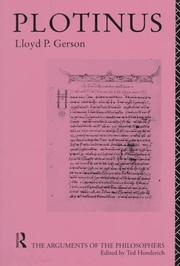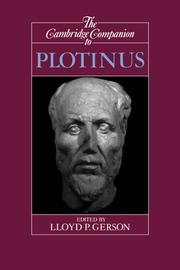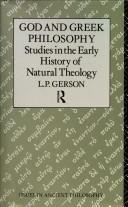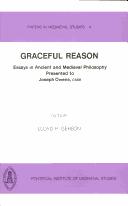| Listing 1 - 10 of 10 |
Sort by
|
Book
ISBN: 9780521876421 0521876427 9780521764407 0521764408 9780521194846 0521194849 9781139095464 9781107573857 9781139095457 9781107577046 Year: 2010 Publisher: Cambridge: Cambridge university press,
Abstract | Keywords | Export | Availability | Bookmark
 Loading...
Loading...Choose an application
- Reference Manager
- EndNote
- RefWorks (Direct export to RefWorks)
History of philosophy --- Philosophy, Ancient. --- Philosophy, Medieval. --- Philosophie ancienne --- Philosophie médiévale --- Philosophy, Ancient --- Jewish philosophy--History --- Philosophie médiévale --- Jewish philosophy --- History --- Philosophy, Medieval --- Medieval philosophy --- Scholasticism --- Ancient philosophy --- Greek philosophy --- Philosophy, Greek --- Philosophy, Roman --- Roman philosophy --- Jewish philosophy - History --- Philosophie antique

ISBN: 0415056624 0415174090 9780415056625 9780415174091 0203011473 041520352X 1134687788 1134687796 1280199172 9004127801 9004453539 9786610199174 Year: 1998 Publisher: London: Routledge,
Abstract | Keywords | Export | Availability | Bookmark
 Loading...
Loading...Choose an application
- Reference Manager
- EndNote
- RefWorks (Direct export to RefWorks)
Neoplatonism --- Plotinus --- #GROL:SEMI-1-05'02' Plot --- Alexandrian school --- Church history --- Hellenism --- Philosophy --- Philosophy, Ancient --- Platonists --- Theosophy --- Boluoding --- Iflūṭīn --- Plotin --- Plotino --- Plōtinos --- Plotinus, --- Plotyn --- Πλωτι̂νος --- פלוטינוס --- أفلوطين --- Neoplatonism. --- Plotinos --- Néo-platonisme --- History of philosophy --- Plotinus.

ISBN: 0521470935 0521476763 9780521470933 9780521476768 9781139000499 Year: 1999 Publisher: Cambridge: Cambridge university press,
Abstract | Keywords | Export | Availability | Bookmark
 Loading...
Loading...Choose an application
- Reference Manager
- EndNote
- RefWorks (Direct export to RefWorks)
Plotinus. --- Plotinus --- 1 <38> PLOTINUS --- Griekse filosofie--PLOTINUS --- 1 <38> PLOTINUS Griekse filosofie--PLOTINUS --- Plotin --- Plotinos --- Boluoding --- Iflūṭīn --- Plotino --- Plōtinos --- Plotinus, --- Plotyn --- Πλωτι̂νος --- פלוטינוס --- أفلوطين

ISBN: 0415113059 0415034868 9780415034869 Year: 1990 Publisher: London: Routledge,
Abstract | Keywords | Export | Availability | Bookmark
 Loading...
Loading...Choose an application
- Reference Manager
- EndNote
- RefWorks (Direct export to RefWorks)
God (Greek religion) --- Natural theology --- Philosophy, Ancient. --- History of doctrines. --- God (Greek religion). --- Antiquity --- Ancient philosophy --- Antieke filosofie --- Dieu (Religion grecque) --- Filosofie [Antieke ] --- Filosofie [Griekse ] --- Filosofie [Romeinse ] --- Filosofie van de Oudheid --- God (Griekse godsdienst) --- Greek philosophy --- Griekse filosofie --- Philosophie ancienne --- Philosophie antique --- Philosophie de l'Antiquité --- Philosophie grecque --- Philosophie romaine --- Philosophy [Ancient ] --- Philosophy [Greek ] --- Philosophy [Roman ] --- Roman philosophy --- Romeinse filosofie --- Philosophy, Ancient --- Philosophical theology --- Théologie naturelle --- Théologie philosophique --- Histoire des doctrines --- -Philosophy, Ancient --- #GROL:SEMI-111.9<09> --- Philosophy, Greek --- Philosophy, Roman --- Natural religion --- Theology, Natural --- Apologetics --- God --- Religion and science --- Theology --- Théologie naturelle --- Théologie philosophique --- History of doctrines --- Early works to 1800 --- Ouvrages avant 1800 --- Religion --- Philosophy of nature --- Natural theology - History of doctrines.
Multi
ISBN: 9780521691895 9780521871396 0521691893 0521871395 9780511801730 9781139129404 1139129406 0511801734 1107197627 1283329948 9786613329943 1139134450 1139132679 0511504640 0511506783 Year: 2009 Publisher: Cambridge: Cambridge university press,
Abstract | Keywords | Export | Availability | Bookmark
 Loading...
Loading...Choose an application
- Reference Manager
- EndNote
- RefWorks (Direct export to RefWorks)
This is the first title in the Key Themes in Ancient Philosophy series, which provides concise books, written by major scholars and accessible to non-specialists, on important themes in ancient philosophy which remain of philosophical interest today. In this book, Professor Gerson explores ancient accounts of the nature of knowledge and belief from the Presocratics up to the Platonists of late antiquity. He argues that ancient philosophers generally held a naturalistic view of knowledge as well as of belief. Hence, knowledge was not viewed as a stipulated or semantically determined type of belief but was rather a real or objectively determinable achievement. In fact, its attainment was identical with the highest possible cognitive achievement, namely wisdom. It was this naturalistic view of knowledge at which the ancient Skeptics took aim. The book concludes by comparing the ancient naturalistic epistemology with some contemporary versions.
Épistémologie --- Theory of knowledge --- Knowledge, Theory of --- History --- History. --- Théorie de la connaissance --- Histoire --- Philosophy, Ancient --- Philosophie ancienne --- Théorie de la connaissance --- Épistémologie. --- Histoire. --- Epistemics. --- General semantics --- Arts and Humanities --- Philosophy --- Knowledge, Theory of - History --- Épistémologie.
Book
ISBN: 080146918X 9780801469183 9780801452413 0801452414 0801469171 150171063X 1322523088 Year: 2013 Publisher: Ithaca, New York: Cornell university press,
Abstract | Keywords | Export | Availability | Bookmark
 Loading...
Loading...Choose an application
- Reference Manager
- EndNote
- RefWorks (Direct export to RefWorks)
Was Plato a Platonist? While ancient disciples of Plato would have answered this question in the affirmative, modern scholars have generally denied that Plato’s own philosophy was in substantial agreement with that of the Platonists of succeeding centuries. In From Plato to Platonism, Lloyd P. Gerson argues that the ancients were correct in their assessment. He arrives at this conclusion in an especially ingenious manner, challenging fundamental assumptions about how Plato’s teachings have come to be understood. Through deft readings of the philosophical principles found in Plato's dialogues and in the Platonic tradition beginning with Aristotle, he shows that Platonism, broadly conceived, is the polar opposite of naturalism and that the history of philosophy from Plato until the seventeenth century was the history of various efforts to find the most consistent and complete version of “anti-naturalism." Gerson contends that the philosophical position of Plato—Plato’s own Platonism, so to speak—was produced out of a matrix he calls “Ur-Platonism.” According to Gerson, Ur-Platonism is the conjunction of five “antis” that in total arrive at anti-naturalism: anti-nominalism, anti-mechanism, anti-materialism, anti-relativism, and anti-skepticism. Plato’s Platonism is an attempt to construct the most consistent and defensible positive system uniting the five “antis.” It is also the system that all later Platonists throughout Antiquity attributed to Plato when countering attacks from critics including Peripatetics, Stoics, and Sceptics. In conclusion, Gerson shows that Late Antique philosophers such as Proclus were right in regarding Plotinus as “the great exegete of the Platonic revelation."
Platonists. --- Platonism --- Philosophers --- Philosophy, Ancient --- Plato. --- Platon --- Plato --- Aflāṭūn --- Aplaton --- Bolatu --- Platonas --- Platone --- Po-la-tʻu --- Pʻŭllatʻo --- Pʻŭllatʻon --- Pʻuratʻon --- Πλάτων --- אפלטון --- פלאטא --- פלאטאן --- פלאטו --- أفلاطون --- 柏拉圖 --- 플라톤 --- Платон --- プラトン --- Platonists

ISBN: 088844804X 9780888448040 Year: 1983 Volume: 4 Publisher: Toronto: Pontifical institute of mediaeval studies,
Abstract | Keywords | Export | Availability | Bookmark
 Loading...
Loading...Choose an application
- Reference Manager
- EndNote
- RefWorks (Direct export to RefWorks)
Philosophy, Ancient --- Philosophy, Medieval --- Owens, Joseph, --- ROLDUC-SEMI --- #GROL:SEMI-1<09> --- Medieval philosophy --- Scholasticism --- Ancient philosophy --- Greek philosophy --- Philosophy, Greek --- Philosophy, Roman --- Roman philosophy --- Owens, Joseph --- Owens, Joseph V. --- Festschrift - Libri Amicorum --- Owens, Joseph, - 1908 --- -Philosophy, Ancient --- Owens, Joseph, - 1908-
Book
ISBN: 9781107001770 9780511736490 9781108712422 1107001773 1108712428 Year: 2018 Publisher: Cambridge: Cambridge university press,
Abstract | Keywords | Export | Availability | Bookmark
 Loading...
Loading...Choose an application
- Reference Manager
- EndNote
- RefWorks (Direct export to RefWorks)
The Enneads by Plotinus is a work which is central to the history of philosophy in late antiquity. This volume is the first complete edition of the Enneads in English for over seventy-five years, and also includes Porphyry's Life of Plotinus. Led by Lloyd P. Gerson, a team of experts present up-to-date translations which are based on the best available text, the editio minor of Henry and Schwyzer and its corrections. The translations are consistent in their vocabulary, making the volume ideal for the study of Plotinus' philosophical arguments. They also offer extensive annotation to assist the reader, together with cross-references and citations which will enable users more easily to navigate the texts. This monumental edition will be invaluable for scholars of Plotinus with or without ancient Greek, as well as for students of the Platonic tradition.
Philosophy. --- Plotinus. --- Philosophy --- Neoplatonism --- Philosophy, Ancient --- One (The One in philosophy) --- Plotinus. - Enneads
Book
ISBN: 0415148847 041514888X 0415148863 0415148871 0415148855 9780415148870 9780415148856 9780415148887 9780415148863 9780415148849 Year: 1999 Publisher: London: Routledge,
Abstract | Keywords | Export | Availability | Bookmark
 Loading...
Loading...Choose an application
- Reference Manager
- EndNote
- RefWorks (Direct export to RefWorks)
Aristotle --- Aristotle.
Book
ISBN: 0918090318 9780918090317 Year: 1998 Publisher: Washington (D.C.): American catholic philosophical association,
Abstract | Keywords | Export | Availability | Bookmark
 Loading...
Loading...Choose an application
- Reference Manager
- EndNote
- RefWorks (Direct export to RefWorks)
| Listing 1 - 10 of 10 |
Sort by
|

 Search
Search Feedback
Feedback About UniCat
About UniCat  Help
Help News
News